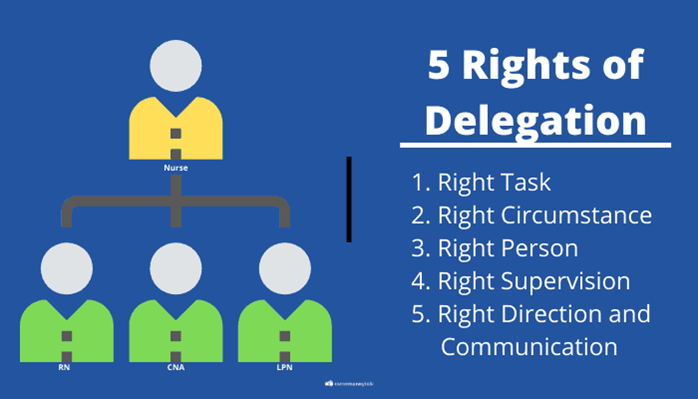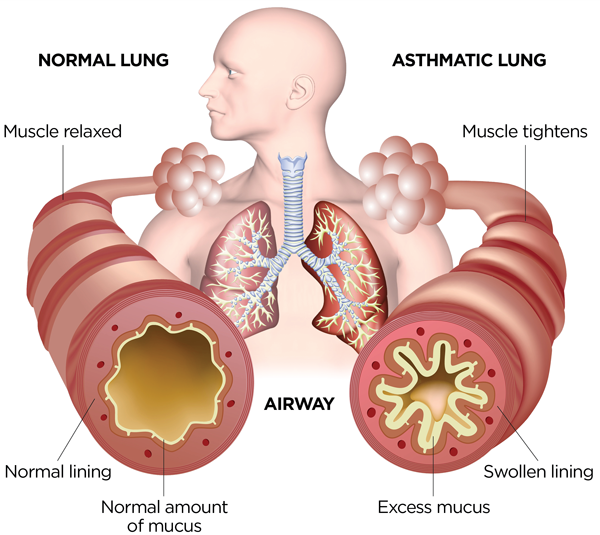A nurse is delegating tasks to assistive personnel. Which of the following should the nurse consider when using one of the five rights of delegation?
The AP's ability to complete the task without assistance
The AP's ability to prioritize
The AP's rapport with clients
The AP has the knowledge and skill to perform the task
The Correct Answer is D
Choice A reason: The AP's ability to complete the task without assistance is not one of the five rights of delegation. The nurse is responsible for providing adequate supervision and guidance to the AP, and ensuring that the task is done correctly and safely.
Choice B reason: The AP's ability to prioritize is not one of the five rights of delegation. The nurse is responsible for assigning tasks based on their urgency and importance and communicating clear expectations and deadlines to the AP.
Choice C reason: The AP's rapport with clients is not one of the five rights of delegation. The nurse is responsible for maintaining a therapeutic relationship with clients and respecting their preferences and needs.
Choice D reason: The AP has the knowledge and skill to perform the task is one of the five rights of delegation. The nurse is responsible for assessing the AP's competence and readiness to perform the task, and providing appropriate training and feedback if needed.

Nursing Test Bank
Naxlex Comprehensive Predictor Exams
Related Questions
Correct Answer is B
Explanation
Choice A reason: Mitral valve disease is not a disorder that makes clients especially vulnerable to ozone effects, as it does not affect the respiratory system. Mitral valve disease is a condition that affects the mitral valve, which is the valve that separates the left atrium and the left ventricle of the heart. Mitral valve disease can cause the valve to become narrow (stenosis) or leaky (regurgitation), affecting the blood flow and oxygen delivery to the body. Mitral valve disease can cause symptoms such as shortness of breath, fatigue, chest pain, palpitations, and swelling of the legs.
Choice B reason: Asthma is a disorder that makes clients especially vulnerable to ozone effects, as it affects the respiratory system. Asthma is a chronic inflammatory condition that causes the airways to become narrow, swollen, and sensitive to triggers such as allergens, irritants, infections, or exercise. Asthma can cause symptoms such as wheezing, coughing, chest tightness, and difficulty breathing. Ozone is a gas that is formed when sunlight reacts with pollutants in the air. Ozone can irritate the lungs and worsen asthma symptoms by causing inflammation, bronchoconstriction, and mucus production. Ozone can also reduce lung function and increase the risk of respiratory infections.
Choice C reason: Nasal polyps are not a disorder that makes clients especially vulnerable to ozone effects, as they do not affect the respiratory system. Nasal polyps are benign growths that form in the lining of the nose or sinuses. Nasal polyps can cause symptoms such as nasal congestion, runny nose, postnasal drip, loss of smell or taste, headache, and snoring. Nasal polyps are usually associated with chronic inflammation or allergies, but their exact cause is unknown.
Choice D reason: Seasonal allergies are not a disorder that makes clients especially vulnerable to ozone effects, as they do not affect the respiratory system. Seasonal allergies are allergic reactions that occur during certain times of the year when pollen or mold spores are high in the air. Seasonal allergies can cause symptoms such as sneezing, itching, watery eyes, runny nose, and sore throat. Seasonal allergies are caused by an overreaction of the immune system to harmless substances in the environment.

Correct Answer is B
Explanation
Choice A reason: Giving care with a focus on the aggregate's needs is not the best description of client-focused community-based nursing, as it implies that the nurse is providing care to a population or a group of individuals who share some common characteristics or risk factors. This is more aligned with the concept of population-focused community-based nursing, which aims to improve the health outcomes of a defined group of people.
Choice B reason: A philosophy that guides family-centered illness care is the best description of client-focused community-based nursing, as it reflects the core values and principles of this approach. Client-focused community-based nursing is a model of care that emphasizes the individual and family as the unit of care, rather than the disease or the health problem. It involves collaborating with the client and family to identify their needs, preferences, strengths, and resources, and providing holistic, culturally sensitive, and evidence-based care that promotes health, wellness, and quality of life.
Choice C reason: Providing care with a focus on the group's needs is not the best description of client-focused community-based nursing, as it suggests that the nurse is providing care to a collective or a social unit that shares some common goals or interests. This is more aligned with the concept of community-oriented community-based nursing, which aims to improve the health status of a specific community or subpopulation.
Choice D reason: A value system in which all clients receive optimal care is not the best description of client-focused community-based nursing, as it does not capture the essence or uniqueness of this approach. While it is true that client-focused community-based nursing strives to provide high-quality care to all clients, it also recognizes that each client and family has different needs, preferences, and expectations that require individualized and tailored interventions.
Whether you are a student looking to ace your exams or a practicing nurse seeking to enhance your expertise , our nursing education contents will empower you with the confidence and competence to make a difference in the lives of patients and become a respected leader in the healthcare field.
Visit Naxlex, invest in your future and unlock endless possibilities with our unparalleled nursing education contents today
Report Wrong Answer on the Current Question
Do you disagree with the answer? If yes, what is your expected answer? Explain.
Kindly be descriptive with the issue you are facing.
